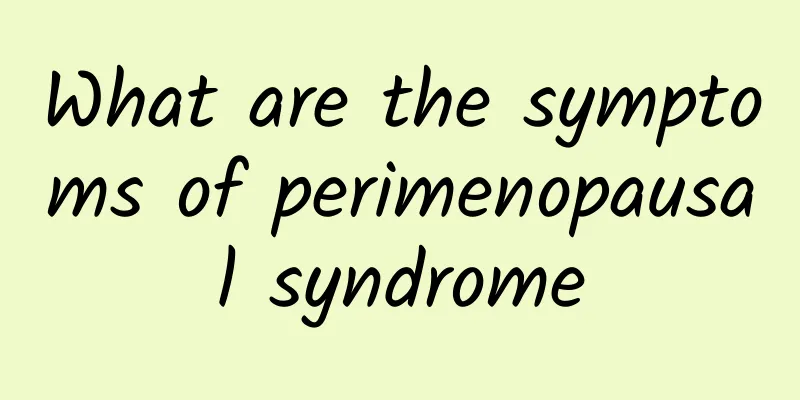What are the symptoms of perimenopausal syndrome

|
The main symptoms of perimenopausal syndrome are: 1. Menstrual disorders are common symptoms, mainly manifested as irregular menstruation, prolonged menstruation, and increased or decreased menstrual flow. 2. Recurrent hot flashes and night sweats, which can affect women's work, life and sleep in severe cases, are the main reasons why perimenopausal women need sex hormone treatment. 3. Symptoms of autonomic nervous system disorders such as palpitations, dizziness, headaches, insomnia, and tinnitus often occur. 4. It is also easy to have difficulty concentrating, mood swings, easy excitement, irritability, anxiety, depression, and even memory loss. 5. With the decrease or lack of estrogen levels, symptoms of urogenital atrophy appear, such as vaginal dryness, pain during intercourse, and recurrent vaginal inflammation and urinary tract infections. In addition, the risk of osteoporosis, Alzheimer's disease, arteriosclerosis, and coronary heart disease increases due to the large loss of calcium. How long after the menstrual period ends can you have sex Having sex too early after the menstruation ends will also have obvious adverse effects on women's health. The main harm of having sex within a short period of time just after the menstruation ends is that it will increase the risk of women suffering from infectious diseases and menstrual abnormalities. The wound of the endometrium has not been completely repaired when the menstruation just ends. Having sex at this time will accelerate the blood circulation in the uterine cavity due to sexual stimulation, causing the basically healed wound to bleed again, resulting in prolonged menstruation, and it is also easy for pathogenic microorganisms to invade the uterine cavity and cause endometritis. Under normal circumstances, women can have normal sex three days after the menstruation ends. The harm of having sex during the menstruation period is self-evident. It can not only cause gynecological infectious diseases, but also increase the incidence of diseases such as endometrial translocation and immune infertility, and it will also cause prolonged menstruation and excessive bleeding. Can I have a gynecological examination during my menstrual period? Women should avoid having gynecological examinations during their menstrual period. It is best to have a gynecological examination 3-7 days after the menstrual period ends without having sex, so as not to increase the chance of infection. During the menstrual period, the endometrium sheds, causing uterine bleeding, and the vagina is filled with menstrual blood. When doing a gynecological examination at this time, it is not clear whether the cervical bleeding is caused by menstrual bleeding or cervical bleeding caused by lesions. Gynecological examinations during the menstrual period are most likely to cause gynecological infections, and the specimens collected during the gynecological examinations will also be affected, which will further affect the diagnosis results. Gynecological examinations during the menstrual period can easily stimulate uterine contractions and form endometriosis. |
<<: What is the average age of menopause? What are the symptoms of menopause?
>>: What to eat for perimenopausal dysfunctional uterine bleeding
Recommend
What causes ectopic pregnancy?
Ectopic pregnancy, also known as ectopic pregnanc...
How to choose a hospital for the treatment of ectopic pregnancy
How to choose a hospital for the treatment of ect...
Self-diagnosis of ectopic pregnancy has clues
Ectopic pregnancy is a common acute abdomen and o...
How to regulate irregular menstruation after childbirth? Try this
Many women will encounter such a situation. After...
Top 10 delicious low-calorie fruits for summer weight loss
Fruit is one of the very good food sources in the...
What are the causes of adnexitis?
What are the causes of adnexitis? I believe many ...
Is cervical erosion moderately serious? Do I need to take medicine?
Moderate cervical erosion is usually not a very s...
Misunderstandings in the treatment of cervical precancerous lesions
For a long time, there have been many misundersta...
How to prevent menopause
What are the prevention methods of menopause? Wom...
Experts teach you how to correctly prevent acute cervicitis
Acute cervicitis is a cervical disease that serio...
What should I pay attention to in my diet for endometrial tuberculosis?
After suffering from endometrial tuberculosis, if...
Is it easy to treat thick endometrium? Can thick endometrium be cured by taking Chinese medicine?
At present, with the rapid development of society...
Is subserosal uterine fibroid a benign tumor? Does subserosal uterine fibroid have any effect on conception?
Among gynecological diseases, uterine fibroids ar...
Experts introduce two causes of ovarian cysts as follows
Women should have heard of the disease of ovarian...
Severe complications of ovarian cysts should be noted
There are many complications of ovarian cysts. Wh...









